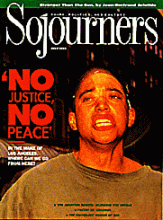Richard Falk, Milbank Professor of International Law at Princeton University, came to St. Louis in 1981 as an expert witness for disarmament activists who were on trial for trespassing at General Dynamics, a weapons manufacturer headquartered there. In the courtroom, Falk argued eloquently for the Nuremberg principles, and for the relevance of international law in matters nuclear.
In exchange for his testimony, the renowned professor requested a breakfast meeting with a handful of activists who were working on various justice issues in local, national, and international contexts. He simply wanted to listen to our stories of campaigns won and lost, to inquire about motivations and the solidarity networks then emerging.
I was reminded of this occasion while reading Falk's latest contribution to world order studies, Explorations at the Edge of Time: The Prospects for World Order (Temple University Press, 1992, $39.95, cloth). Falk is interested in social change efforts because he sees them as prefiguring a different kind of world, one where human rights and human relations become the center of politics.
Eschewing a Marxist conception of change that brings the proletariat to power through revolutionary violence, Falk argues that egalitarian social movements committed to feminism, nonviolence, and environmentalism are important for the significant differences they make in people's lives right here and now. Yet he also insists that today's social movements determine tomorrow. They are an indispensable training ground -- a model -- for a new social and political world order that is emerging.
Read the Full Article

